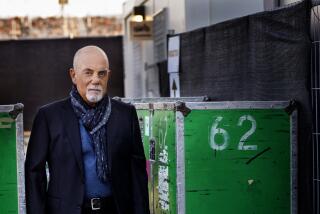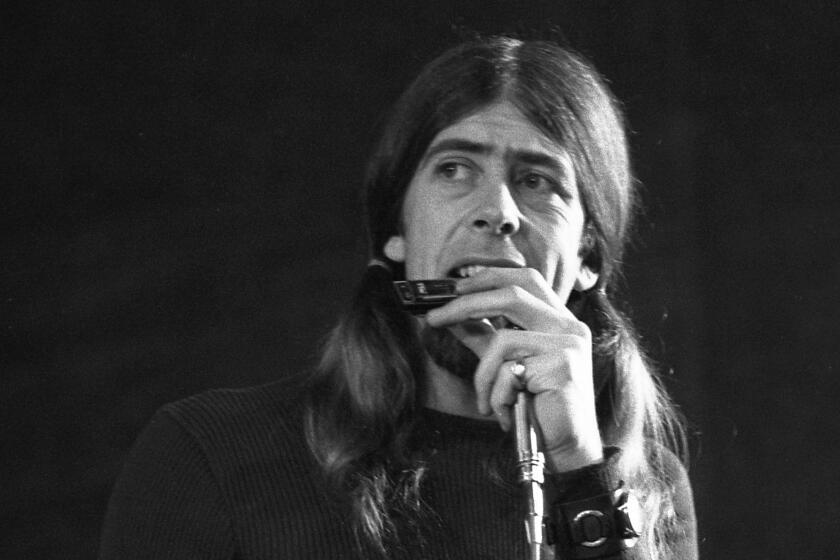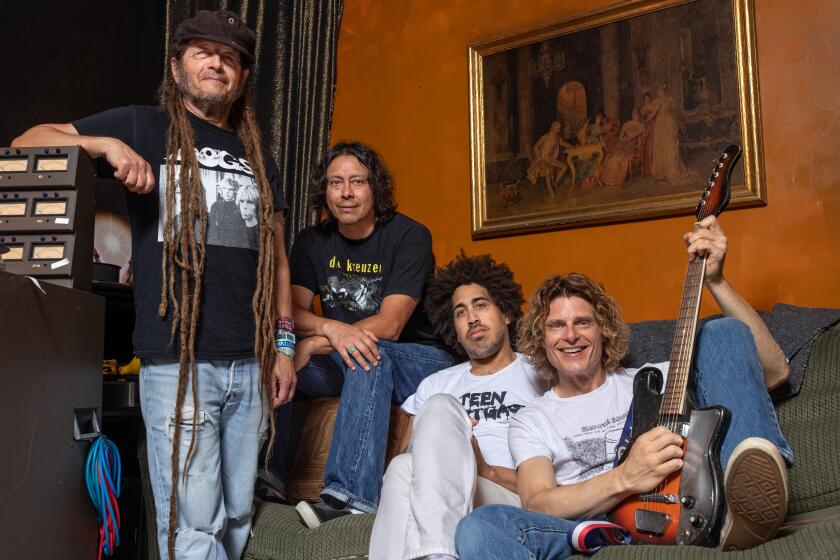Staff Benda Bilili’s Congolese rhythms hit global scale
In the long history of music, there have been improbable success stories. But even in such company, as a drunk man in the French documentary “Benda Bilili!” argues, there has never been anything like the Congolese “street-orchestra” Staff Benda Bilili.
Or as the band’s 55-year-old leader Leon “Papa Ricky” Likabu explained during the group’s recent stop in Paris to support the film’s opening: “Since God created the world, no one has seen five or six disabled guys play music like this.”
Formed by paraplegic and sometimes homeless middle-aged men in Kinshasa, the capital of the Democratic Republic of Congo — and one of the most dysfunctional cities on Earth — Staff Benda Bilili now numbers five musicians in wheelchairs and three physically able younger men, including a teen prodigy named Roger Landu who has learned to play rock, funk and rumba with an instrument that he invented by attaching a piece of wire to a large jam jar. He presses or pulls the wire with one hand to alter the pressure and change notes with the astounding dexterity of a guitar hero — albeit one playing a strange, shrunken one-string guitar that he calls a “satonge.”
Likabu recalled the path that led him here to the small garden of Le Comptoir Général, a funky Paris loft space, as members of the band prepared to play an acoustic gig for the winners of an online contest.
It’s a long way from Kinshasa, but the musician concluded long ago that he had to find a way to take his band across the world. He couldn’t have imagined that his fellow musicians, who slept nightly on cardboard “mattresses” illuminated by burning trash, might end up here, let alone in tailored suits at the Cannes Film Festival.
After all, Kinshasa is a city that has in recent years swelled with refugees from one of the deadliest wars since World War II, one that continues in pockets on the other side of the vast country. Now an anchor for international humanitarian efforts, the central African city is a place where those with physical deformities — and five of the band members are afflicted with polio — are generally treated like pariahs.
But in 2003, Likabu started a “handicapped band” that merged Congolese rhythms with those from the Americas and Europe. Disabled band members would ride their customized, motorized three-wheeled wheelchairs (that look like something out of “Mad Max”) to the banyan tree in the city’s scruffy zoo to rehearse far from the urban din. When they had no money for gas for their wheelchairs, street children — sometimes including their own — would push their slow-moving musical caravan there.
About a year later, on a strangely calm night in central Kinshasa, a pair of intrepid French documentary filmmakers stumbled upon the ragtag band of musicians playing a mournful ancestral blues-rumba for a cluster of shege, the city’s ubiquitous and much-feared street children. “We were a bit overwhelmed to see this group of disabled guys playing music with homeless kids all around,” explains documentary filmmaker Florent de La Tullaye. But musically, he adds, “We were thunderstruck.”
What they heard was hard to categorize, but it had a lot in common with the hand-to-mouth lives that the band’s members carved out on the streets of Kinshasa. They played instruments that they made themselves with materials at hand, infusing their ramshackle guitars, drums, and, especially, the satonge with a distinctive, gritty and often sorrowful tone — even in some songs that grooved toward euphoria.
He and his collaborator, Renaud Barret, immediately sensed that Staff Benda Bilili’s music soothed the tense and desperate street children, who are regularly chased from storefronts, bars and restaurants by guards armed with sticks and clubs. Many of the band’s songs, which highlight the ebb and flow of life on the streets, speak directly to the experiences of those kids.
Barret and La Tullaye decided to make a film focusing on the band, and Likabu immediately welcomed them. “The white guys have arrived,” the bandleader said with his understated humor. “That’s cool. We’ll work with you.”
Only later did the filmmakers discover the substance of the lyrics, mostly sung in Lingala with snippets of French (a legacy of colonial Belgium). Band members refer to themselves as “street journalists” for songs that bear witness to their urban experiences. The words offer wisdom about street life, encourage empathy with and humbleness toward those who sleep beneath the stars or who have been struck down by polio and do so without sentimentality and often with a striking sense of humor. (One of their slogans is, “We’re all handicapped, ain’t we?)
During five years of filming, Staff members endured personnel changes, a fire that left them homeless, the disappearance of a child drummer who was never seen again, and several deaths close to the band before the documentary was completed.
The filmmakers were hardly a passive force in the rise of the group. They met the 13-year-old Roger, with his strange lute, at a soup kitchen in 2004 and introduced him to the band. That someone was filming the collective’s progress, the Frenchmen say, made the musicians take their craft more seriously. And the filmmakers facilitated the involvement of a Belgian music label, Crammed Discs (with a long history of bringing Congolese acts to the world), who recorded the band’s first professional recordings.
“Très Très Fort” (“Very Very Strong”) came out in Europe 18 months ago, and suddenly Likabu’s dream seemed less absurd. Musically, the group’s broad influences run from Congolese rumba, ancestral blues and particularly mellow and contemplative reggae to James Brown (a legend in Kinshasa) and Afro-Caribbean music that many Western listeners associate with aging Cuban musicians. In the Jimmy Cliff-like song “Polio,” poignant melodies come together in off-kilter harmonies that meander amiably over a gentle reggae guitar riff, while in other ballads they hint at Tom Waits — if he had grown up on the streets in the land of soukous.
The CD earned them an invitation to tour, so the members of Staff Benda Bilili secured passports, visas and plane tickets. “The first time we left [Kinshasa], people asked: ‘What are you doing going to Europe?’” recounts Likabu. “I was going to prepare the rest of my life. No one understood.”
In fact, few people in Kinshasa believed that a band of untouchables could go anywhere. But Staff’s first international gig was the real deal. It had a daytime slot at the huge annual Eurockéennes music festival. Middle-aged guys in wheelchairs and a kid rocking a jam jar don’t normally share a bill with the likes of Kanye West and Slipknot.
Over the next 18 months, the group emerged as a burgeoning international phenomenon thanks to dozens of club gigs, television and music festival appearances, including Glastonbury in the U.K. and the Montreal Jazz Festival in Canada. But it was at the Cannes Film Festival last spring when Likabu realized that they might rival — or even surpass — their musical forbearers who had become global stars.
Congolese legends such as Franco Luambo, Papa Wemba and Tabu Ley Rochereau, more recent slick, braggadocio-heavy pop stars like Koffi Olomide and Werrason, and even the grittier Konono No. 1 (who recorded with Bjork) have all garnered international fame. None, however, had ever played the Cannes Film Festival. But dressed in dapper suits, Staff Benda Bilili put on a rollicking gig for the well-heeled festivalgoers on the Côte d’Azur. “Before, I believed,” Likabu says, “but that’s when I knew: This is real.”
After the recent brief stop in Paris — to coincide with the French release of the documentary — the band returned to Kinshasa to spend time with family. . It’s in the middle of a three-week tour of Japan, and then, likely tours in Australia and Brazil. Once the details are sorted out, Staff’s management intends to bring it to the United States to coincide with the film’s release, although no date has been set.
Early film reviews have been positive. London’s Daily Telegraph called it “a remarkable documentary and a music film that is utterly exceptional,” and the Hollywood Reporter declared it a “rousing depiction of unimaginable poverty and transcendent resolve...”
Given such praise, some bands might fear losing their authenticity, but “The Staff” members seem unfazed — although they appreciate that they now own mattresses and sleep in solid structures. “Now my life has started to change, but the people in the street are still my friends. If they say something to me [about selling out], I’ll say, ‘I was in the street with you,’” Likabu says. “People never believed that we would succeed. But I see beyond appearances. I always believed. That’s why I knew that we had to do a world tour, to show the world what we are capable of.”
calendar@latimes.com
More to Read
The biggest entertainment stories
Get our big stories about Hollywood, film, television, music, arts, culture and more right in your inbox as soon as they publish.
You may occasionally receive promotional content from the Los Angeles Times.






